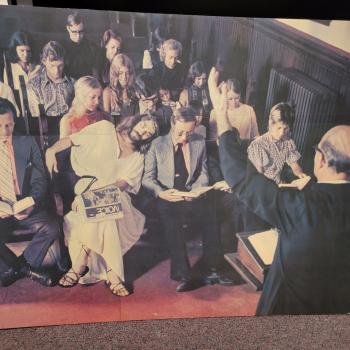One of the most crucial sections in Wright’s whole exposition begins on pp.815ff. Here he argues that the purpose for which God had intended Israel was fulfilled in and through Jesus the Messiah. Christ is the place where the God of Abraham and the people of Abraham meet, according to Wright. He is monotheism and election all wrapped up into one person. He will go on to argue that the death of Jesus on the cross brought to fulfillment the whole purpose of election (which was apparently to save the world).
Key to understanding Tom’s perspective is his insistence that the term ‘Christos’ is used by Paul as more than just a cipher or even just a second name for Jesus. It is a Jewish title announcing that Jesus is the long promised Jewish messiah. I think there are texts where this becomes clear, such as Rom. 9.5 or 1 Cor.1.23- it was as the Jewish messiah that Jesus was crucified, not merely as a human being. In the 7 main Pauline letters we have some 270 references to Jesus as Christos,another 70 in Ephesians, Colossians and 2 Thess. and another 30 in the Pastorals. The term is ubiquitous. I agree that Paul believed, and that this term indicates, that Jesus was the Jewish Messiah. The question is whether there are places where it is used more as just a name (an alternative name for Jesus), or is it always carrying the freight of signifying Jesus is the Jewish messiah. I suspect that there are various places where it ‘functions’ as a name, even though it never loses the overtones of its Jewish meaning. And when it functions as a name, sometimes it will be overpressing the term to read into this or that particular verse the whole Pauline theology about the Jewish messiah. This time around, Tom places major stress on Rom. 15.1-12, and so the resurrection of the Davidic King is the sign that he is to rule the nations. One wonders how all this Davidic focus in Paul comports with, or at least coheres with the strong emphasis in the Gospels on Jesus being Son of Man, something Paul does not call Jesus. It is possible to argue that Paul uses the terminology of Last Adam as an alternative way of speaking of such a theme, but in fact the Son of Man in Dan. 7 is not Adam, he is in fact a being who comes down from heaven to judge the world, and rule forever and be worshipped by all nations.
At pp. 820-21 we have probably a misreading of 1 Cor. 15.24-25. Tom wants to suggest it means that God the Father must rule until he puts all of the Messiah’s enemies under his feet, based on the assumption that here is an allusion to Ps. 110.1. This however is not probable. The grammar suggests that it is Christ doing the ruling and putting things under his own feet, including the last enemy death, and then handing the Kingdom back over to the Father. It reads quite literally backing up to vs. 23— each in it’s own order:1 ) Christ the first fruits, 2) then those of Christ in his parousia (coming), 3) then the end when ‘he’ delivers up the kingdom to God (note that the only possible antecedent for ‘he’ here is Christ. Paul is not saying God the Father delivers up the kingdom to himself). We have two parallel ‘hotan’ clauses here and so the ‘when he delivers up’ is paralleled in the next clause with ‘when he brings to nothing all rule and authority…’. Again vs. 25 assumes the same antecedent when it says ‘for it is necessary that he must rule until he puts all enemies under his feet’. This comports with the clear picture in Rev. 20 where it is Christ and the saints doing the ruling and subjecting and judging of things. The allusion in vs. 27 is not to Psalm 110.1, but rather to Psalm 8.6, which speaks of humans ruling over creation. In short, sometimes Tom ‘over-eggs the pudding’ as the Brits would say over reads the Pauline text in light of OT passages he things are in play. In this case it is a different OT text in play. I would stress as well that Paul is perfectly capable of using the OT in creative and homiletical ways that are not grounded in a detailed contextual exegetical treatment of those OT texts. This is not always so, but it is so some of the time.


















